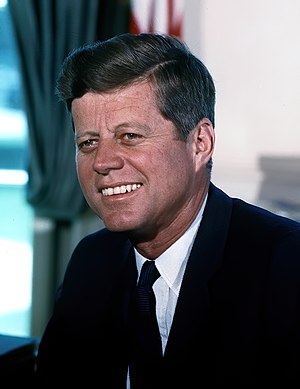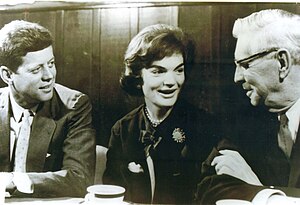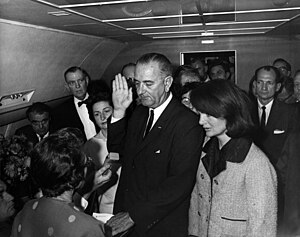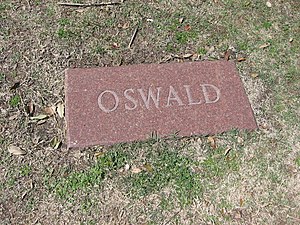
JFK -- what we really remember and want to forget
an American Arab remembers
By Ray Hanania

- English: John F. Kennedy, photograph in the Oval Office. (Photo credit: Wikipedia)
Probably more than half of the people living in America today were not born when President John F. Kennedy was assassinated. I was only 10 years old and to be honest, I knew nothing about him. My parents generation would often talk about how handsome he was and how beautiful the First Lady Jacqueline Kennedy was.
There was another "politician" that my parents generation were talking about, too, at the time who took Kennedy's place after he was killed. His name was Charles Percy. His daughter had been murdered the five newspapers that came to our house screamed in giant headlines. During his election, our elementary school asked who would we vote for -- everyone picked him because he was "better looking" than the other guy, Senator Paul Douglas.
Good looks meant a lot in politics and elections in those days.
But that was it. I was too young to understand the Bay of Pigs invasion screw-up in Cuba. It meant nothing to me that his brother, Bobby Kennedy, was appointed the U.S. Attorney General and his priority was to crack down on the Mafia, which FBI Director J. Edgar Hoover insisted did not exist. I didn't know that either.
I knew the United States and Russia were at odds and we might blow ourselves up with nuclear weapons because I had watched movies like "Them" in which nuclear weapons explosions had created giant ants. As a 10 year old, that was scary, even though when I watch the movie "Them" again today, I wonder how the simplistic filmmaking could have scared anyone. But there was the Russian satellite, called "Sputnik" which was a round silver-like ball of metal with three "legs" or antennas.
Sputnik had been launched in 1957 just before Halloween -- I was only 4 then and a few people had dressed up like the frightening Russian satellite. Sputnik flew around the earth for about 22 days before it stopped working and then came crashing down weeks later in January 1958. But the fear that overcame America lasted years and fueled the "Space Race."
November 22, 1963, that Friday morning when I was walking up the slight hill of Chappel Avenue at 92nd Street to return to school, was just a normal day. I went to Joseph Warren Elementary school -- yes, we literally walked a mile four times a day including to and from school in the morning and afternoon, and to and from school for lunch. There wasn't any snow because it wasn't slippery. As I walked back to school, a friend who was inside the fenced playground that was adjacent to the side walk yelled to me, "Hey Ray. The President is dead."

- English: President John F. Kennedy, First Lady Jacqueline Kennedy Onassis, and Senator Patrick V. McNamara (Photo credit: Wikipedia)
What president? Who? Kennedy? We didn't call him JFK. The handsome guy our mom's liked. He was dead. Shrug. What did I know. Seriously. I meant nothing to me. Except that the school gathered us all together into the auditorium and the Principal and some of the teachers said things that I don't remember. And then they sent us home, which was not cool because my dad worked at Sinclair Oil downtown and my mom worked at Solo Cup not too far from the school, after we finished lunch.
That's what I remember. That's all I remember of that exact moment. I see the uphill inclined sidewalk. The fence. The kids playing in the playground next to the new yellow bricked school building with the flat roof that made it look like one of those Frank Lloyd Wright homes my dad was always talking about, a few were in the neighborhood. The old, brown bricked school building with the steep inclined roof was straight ahead.
That's it. But that's what has haunted me ever since. The memory of "where I was" and "what I was doing" has remained burned in my mind ever since. And instead of fading away, it has festered like an open wound. The Kennedy Funeral dominated everything the entire weekend. We had little transistor radios made of plastic that we purchased for a few dollars with little ear plugs to listen to the Beatles music and rock and roll music. Between the songs, there would be a lot of talk. We'd switch from WLS to WCFL. It was a radio station battle back then and we picked up the Silver Dollar Surveys from the local record store which listed what new songs were out and how they ranked.

The television was small. Black and white. I recall watching the funeral procession. And seeing the rebroadcast of the shooting of Lee Harvey Oswald, the man the media and police immediately concluded had killed Kennedy. There was never any doubt and there was never a real investigation. It was Oswald and that was that. The Warren Commission and everything that came out of the mouths of our government, including "LBJ," that "cowboy" who no one really liked but who was no president, all said the same thing. Done. Closed, That's it pal.
We were afraid that the Soviet Union was going to bomb us with nuclear weapons and I would transform into some kind of monster bug from the radiation, if we didn't burn up. Thank God for our little classroom desks with the shiny beige tops that would protect us from the fallout that we climbed under during Nuclear Attack Air Raid drills in school.
If we had children hiding under desks at school for any reason, parents would go berserk today. Screaming and filing lawsuits against the schools and teachers and it would turn into a political crisis. But back then, we were afraid. And everyone had to been afraid that just maybe the Soviet Union was involved in murdering Kennedy. That's why the government had to fight so hard to convince us it wasn't the Soviet Union because if it was, we would be screaming for revenge. We would bomb the hell out of those "Communists." Those "Commies."
I knew those words. Fear of nuclear bombs and a Soviet invasion was real. It was only 18 years since the end of World War II and the Nazi invasion and destruction of Europe. And the Nazis did horrible things. The gassing of prisoners and mass murder, later called the Holocaust, was frightening.

- Lyndon B. Johnson taking the oath of office on Air Force One following the assassination of John F. Kennedy, Dallas, Texas, November 22, 1963 (Photo credit: Wikipedia)
George Orwell's book "1984" was not a piece of fiction. It was the boogieman that lived in our minds. And we were headed in that direction back in 1963, only 18 years after World War II. The war had only been over 8 years when I had been born. It was fresh in our minds.
If there was even a hint of a conspiracy or Soviet involvement through Oswald, we would have gone to war. Although, maybe no one really wanted to go to war. Maybe our technology wasn't as great as we thought. The Soviets, after all, beat us to Outer Space. When we look back at it from today's perspective, "Sputnik" was just a metal ball. A symbol of the space race. But back in 1963, Sputnik flew above our homes and scarred the crap out of Americans. Our imaginations were bing fed fear. What did we really know?
If we attacked the Soviets, the Soviets would attack us. Nuclear carnage. A nuclear nightmare. We might beat them, our politicians assured us, but everyone knew that in a nuclear exchange both places would be sizzling, smoldering wastelands of radioactive rubble, breeding giants ants, gila monsters and awakening God knows what from the Earth's crust. Was our nuclear arsenal really better than the Soviet nuclear arsenal? We didn't know for sure. They told us it was but no one really trusted to government.
Today, all of that is meaningless. And when we try to understand the pathetic investigation that was decided minutes after JFK was shot that Oswald was the killer, the fear of a conspiracy drove people to the edges of paranoia. We didn't want to go there. We didn't want to go there.

- The body of President John. F. Kennedy lies in repose in the East Room of the White House. (Photo credit: Wikipedia)
Blaming it all on Oswald was a convenient way to relax the American people. It made us feel comfortable. It made us feel safe. It was just one guy. Never mind all the strange and contradictory facts that were never really explored or considered.
Oswald tried to kill a retired American General a few months before using the same Italian-made Mannlicker Carcano rifle. He was 100 feet away hiding behind a bush outside the guys house. And he missed.
And from atop the 6th Floor of the Texas School Depository Building he fired a first shot when the limousine was closest and clearest in front of his site, and missed. And then finally hit Kennedy in the upper back with a second shot as the limousine was further away. And then finally, hit the president in the kill zone, cross hair shot in the back of the head from even further way, a distance almost three times what he tried to do when he missed the General who was standing and not moving 100 feet away months before.
How is it that almost four miles away, a Dallas police officer just happened to see a White Guy walking the street doing nothing to bring attention to him except walking the street, and the decide to pull him over for a first look because a few descriptions had been given of the killer? And Oswald just went home and grabbed his handgun and decided to go out of his apartment. All that time passed since the killing. So many White guys with light hair and jackets walking the streets, but Oswald is picked out like a needle in a haystack. And then after a second confrontation with the police officer, Oswald shoots him.
The Dallas police were corrupt in 1963. The Mafia that Hoover claimed didn’t exist had their little tentacles into the police. Jack “Ruby” Rubenstein, who murdered Oswald on live television 48 hours after JFK was killed in the basement of the Dallas Police headquarters, was a pal of the Dallas Police.

- English: Grave of at the Shannon Rose Hill Memorial Park in . (Photo credit: Wikipedia)
The police confronted Oswald in the Texas School Depository building less than 2 minutes after the killing on the 2nd floor cafeteria of the building. He was holding a bottle of pop. He wasn’t rushed. Wasn’t sweating from running down the stairs from the 6th floor only seconds earlier. Not disheveled. Calm. And just shrugged his shoulders when the police officer asked who he was and the building manager said he’s an employee of the building. And then let him go.
And then we are supposed to believe that this man who shot the Dallas Police Officer who had Soviet ties but didn’t have Soviet ties was the sole killer because the gun was found on the floor where he was supposed to be working.
Why ask those questions? Why try to find out the truth? Why not just lie and makeup a set of facts and have your government buddies print it in a massive document that no normal person could or would bother to read, and just tie the bow and put the whole sordid crisis away in the back of our minds where it sits refusing to leave. Unanswered. Unfinished. Suspicious. And full or questions and concerns. A dark place in our minds from a dark period in our lives where fear really reigned but today sounds so ridiculous to try to argue.
But it was.
That’s what I remember.
(Ray Hanania is an award winning columnist. Reach him at www.TheMediaOasis.com. Or follow him on Twitter @RayHanania.)


















